Objects Κέντρον Ερεύνης Ελληνικής Φιλοσοφίας
<< 10
10 >>
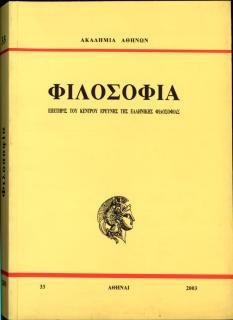
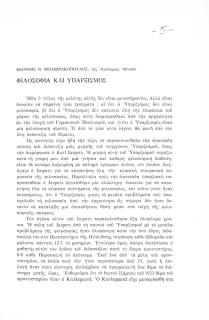
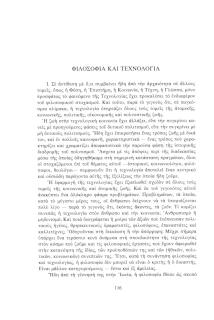
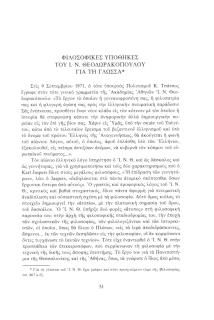
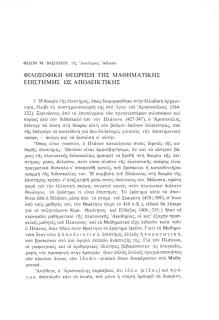
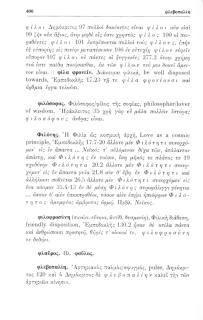
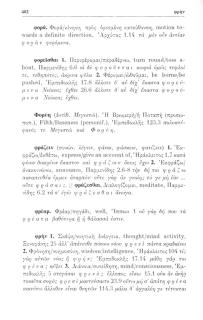
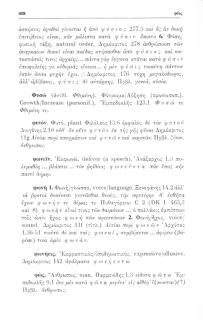
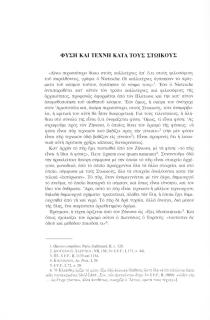
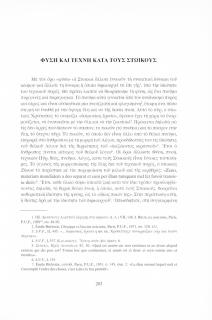
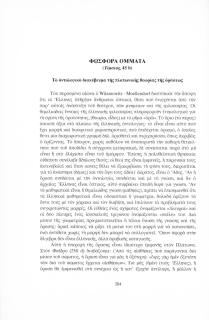
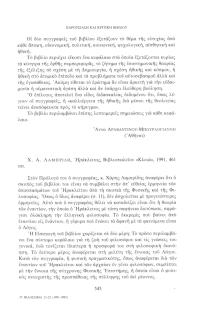 << 10
10 >>
<< 10
10 >>
Total: 4244

Φιλοσοφία
Ενότητα: Περιοδικό Φιλοσοφία
33
Φιλοσοφία και Υπαρξισμός
Ενότητα: Άρθρα του περιοδικού "Φιλοσοφία"
Schon als Teilnehmer am Oberseminar Karl Jaspers’ in den zwanziger Jahren hatte der Verf. Durch sein Referat über «Existenz und Venrunft» seine Bedenken gegen den damals enstehenden Existenzialismus zum Ausdruck gebracht, indem er die Meinung vertrat, der Existenz-Begriff decke nicht alle philosophischen Probleme und Existenz stelle ein Problem, das nur die Vernunft zu behandeln vermöge. Die Vernunft, der Nous, war gerade der breiteste Begriff der Griechischen Philosophie, den man dem viel engeren der Existenz gegenüberstellen sollte. Hervorgehoben wurde gerade, daß auch Plotin, der mit seinem metaphysisch-mystischen Erlebnis über den Nous schreitet, eben diesen Nous als den obersten Begrfiff aller Philosophie betrachte. Vernunft und Existenz deckten sich also nicht miteinander. Vielmehr repräsentiere die Existenz eines von den Problemen der Vernunft, weil nur diese zu philosophieren vermöge. Zu der verständnisvollen Reaktion Jaspers‘, der jedoch damals das Primat der Existenz lebhaft verteidigte und Kierkegaard als eine Wendung in der Ge...
Φιλοσοφία και τεχνολογία
Ενότητα: Άρθρα του περιοδικού "Φιλοσοφία"
In contrast to what has happened with other fields of Philosophy since Antiquity (such as Nature, Science, Society, Ethics, Art, Language) Technology has come under the focus of Philosophy only recently. And this, despite the fact that Technology affects every aspect of human life in a worldwide scale. Nevertheless, nowadays there is a gap between the importance of technology itself to human life and the number of philosophical treatises devoted to this. So, in the encounter of Philosophy and Technology, Philosophy cannot be the judge; rather this is the defendant, even by negligence. During all human history, Technology has always been regarded as a natural facet of human existence, as a sort of extension of human being. In fact there was a unity between Technology and human being itself, since the former was an authentic manifestation of humanity in its relation to the world. The problem in our days, however, consists in the fact that this unity has been broken. Which creates the necessity of a new approach to the phenomenon of modern T...
Φιλοσοφικές υποθήκες του Ι.Ν. Θεοδωρακόπουλου για τη γλώσσα
Ενότητα: Άρθρα του περιοδικού "Φιλοσοφία"
Δεν υπάρχει περιγραφή
Φιλοσοφική θεώρηση της μαθηματικής επιστήμης ως αποδεικτικής
Ενότητα: Άρθρα του περιοδικού "Φιλοσοφία"
The theory of science had been initiated by Aristotle in his Posterior Analytics. It might be said in general that Aristotle identifies here this theory with mathematics. The inquiry about his first principles of science, which cannot be known by demonstration (deduction) and which is the basis of the theory of science, had been discussed by Aristotle in a separate book following his Analytics. Of course, this inquiry is a metaphysical one. From Aristotle’s point of view, the faculty of intuitive reason based on experience is that through which one begins to grasp those principles. Aristotle’s underlying theory is to be found on Euclid’s Elements, written a generation later. On the other hand more recent theories of science, such as Descartes’, Leibniz’ and Kant’s, have a great affinity with the ancient theory. It seems therefore that this theory dominated for many centuries scientific as well as philosophical thought. The aim of the present paper is to examine, following a consideration of the earlier aspects, the recent thesis of mathe...
Φιλότης
Ενότητα: Λεξικό Προσωκρατικής Φιλοσοφίας
Η Φιλία ως κοσμική αρχή
Φορύη
Ενότητα: Λεξικό Προσωκρατικής Φιλοσοφίας
Η Βρωμερή/η Ποταπή (προσωποπ.)
Φυσώ
Ενότητα: Λεξικό Προσωκρατικής Φιλοσοφίας
Φύτρωμα/άνθηση (προσωποπ.)
Φύση και Τέχνη κατά τους Στωικούς
Ενότητα: Άρθρα του περιοδικού "Φιλοσοφία"
Δεν υπάρχει περιγραφή
Φύση και τέχνη κατά τους Στωϊκούς
Ενότητα: Άρθρα του περιοδικού "Φιλοσοφία"
Selon les Stoïciens la Nature, en qualité de feu artiste, représente tantôt la force qui contient le monde tantôt celle qui fait pousser les êtres vivants sur la terre. La nature est considérée comme un esprit créateur qui, pénétrant la matière, lui donne la vie. Dans notre étude nous soutenons la thèse selon laquelle Nature, Dieu, Esprit, Logos, sont considérés comme étant la même chose. Il s΄ensuit que la divinité, en tant qu΄un artiste vise l΄utile et le plaisir (D.L. VII, 149). Le Stoïcien garde une attitude amicale envers l΄esprit divin, grâce à son rapport avec lui, fondé sur la logique. L΄homme, à travers ce rapport, devient capable de mettre en fonction ses sensations, puisque l΄âme se trouve en accord avec le mouvement cosmique. Dans cette perspective le Stoïcien essaie de saisir et de comprendre la nature qui l΄entoure. Ainsi, a-t-il recours aux formes géométriques facilement saisissables, pour expliquer les différentes thèses de la philosophie stoïcienne. Il contemple la beauté de la nature dans toutes ses expressions, à savoir ...
Φώσφορα Όμματα (Τίμαιος 45b). Το οντολογικό διακύβευμα της πλατωνικής θεωρία της οράσεως
Ενότητα: Άρθρα του περιοδικού "Φιλοσοφία"
Wilamowitz a dit des Grecs antiques qu΄ils étaient des «penseurs visuels». Cette formule semble reprise par Heidegger lorsqu΄il montre que l΄ontologie de la présence, dont la source est platonicienne, est suspendue à une certaine suprématie du voir, laquelle fonde le privilège de la vie théorétique et, parmi les cinq sens, des «yeux porteurs de lumière» (Timée, 45 b). Si c΄est bien une vision qui nous introduit, au bout du chemin tracé par le logos, dans le «lieu intelligible», le paradoxe dès lors est grand, pour une philosophie qui n΄a cessé de nous mettre en garde contre les prestiges du sensible, de manœuvrer aussi massivement une métaphorique visuelle afin d΄éxprimer notre ouverture à l΄être. C΄est de ce paradoxe que nous voudrions, philosophiquement, nous étonner, et peut- être, nous illuminer.

